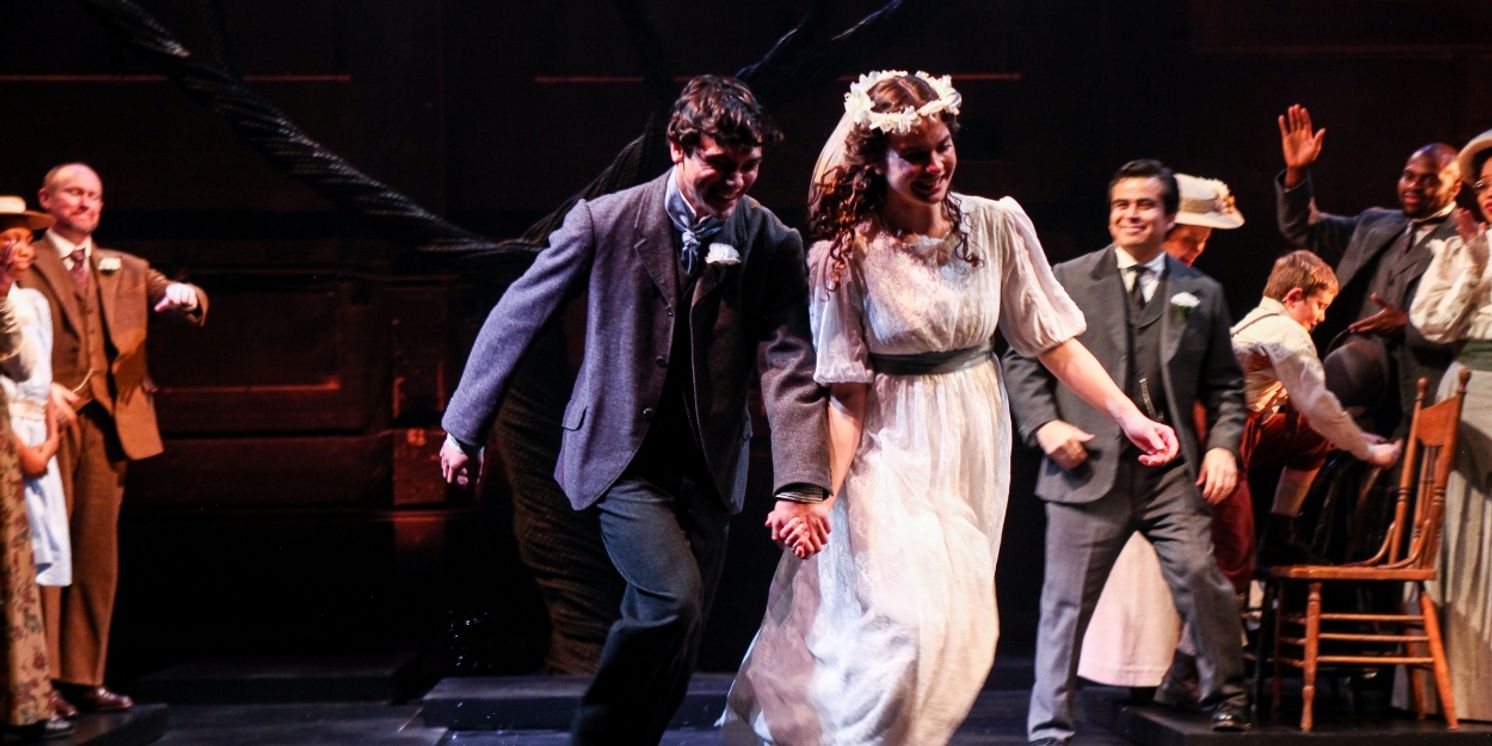Review: OUR TOWN at Syracuse Stage
The production runs through April 16th.

The Syracuse Stage production of Our Town celebrates the 125th anniversary of the birth of Thornton Wilder. One might think a play written in 1938 would be irrelevant for an audience in the 21st century. But it is important to remember that the world at that time faced a severe worldwide economic downturn, the danger of impending war, strong political division, rising nationalism and rapid technological advancement. Given that these problems plague us today, Our Town is especially meaningful in our time.
Wilder sets the play in idyllic Grover's Corners, New Hampshire in 1901. The latitude and longitude given in the Stage Manager's opening monologue places the fictional town off the coast of Massachusetts evoking a mystical, mythical, American version of Shangri-La. Thus the play is taken out of time. By creating this utopia, Thornton Wilder allows the audience to see the fragility and strength, love and cruelty innate in the human heart. Like his contemporaries Robert Frost, Norman Rockwell and William Carlos Williams, Wilder uses the guise of simplicity to delve into a deep, complex and troubled human experience. Our Town is a poetic masterpiece that forces us to look at ourselves both critically and with compassion.
By honoring Thornton Wilder's vision to maintain a bare stage and "understatement of sentimentality," director Robert Hupp highlights human passion even in the simplest moments of life. Ritual, social bonding and ultimately love are conveyed by a strong and capable ensemble of actors.
In Act I we meet the Stage Manager portrayed by Jim True-Frost. Dressed in modern casual garb as he interacts with the town, he links us to the idealized past. He is a comfortable storyteller and audience confidante bringing naturalness to the role. He introduces us to the Gibbs and Webb families. Act I is a presentation of one ordinary day in their lives and the workings of the town with commentary often spoken directly to the audience. Without scenery or props, the cast creates a lively and specific reality. Christine Albright's precision as Mrs. Webb expresses an adventurous energy inside a stoic New England body, a buttoned-up version of her ardent daughter. Derek Emerson Powell as Howie Newsome coaxes an imaginary and stubborn horse across the stage. Danyon Davis as Professor Willard is comically pedantic and overly precise as he discusses the history of the town. Blake Segal plays Simon Stimson with melancholy and deep distain for his lot as church organist and choir director. His nuanced performance conveys both comedy and pathos.
Act II revolves around relationships. At the center is the moment when young George and Emily "first knew - as the saying goes - that they were meant for one another." Syracuse University drama students Diego Echevierra De Cordova and Magdaliz Rivera are endearing in their roles as they shyly and nervously struggle to express their feelings for one another. Our Town is their story. As they grow older and mature throughout the three acts, these young actors bring energy and passion to George and Emily. In fact, the intensity of the relationship they create elevates all of the relationships in the play. Fine performances are delivered by Alberto Bonilla and Christine Albright as Mr. and Mrs. Webb and Michael Stewart Allen and Che Lyons as Dr. and Mrs. Gibbs.
In Act III Thornton Wilder's script is at its poetic best. Michael Keck's haunting soundscape and Yael Lubetzky's somber lighting enhance the strong acting, propelling the show to its emotional conclusion.
Our Town is a play for our time and all time. It is whimsical, thought provoking, honest and profound. It delights, deepens and sometimes darkens our perception of the human condition. It is a play that deserves its exalted place in the canon of American theatre. Syracuse Stage deserves praise for admirably and faithfully celebrating Thornton Wilder and his greatest work.
Syracuse Stage's production of Our Town runs through Sunday April 16th in the Archbold Theatre. For ticket information contact Syracuse Stage (315) 443-3275 or syracusestage.org.
Reader Reviews
Love Theater in Central New York? Join The Community!
Whether you've got past experience writing about theater or just starting, the BroadwayWorld Community offers a unique opportunity to become a champion for your local arts community, helping raise awareness of local offerings and adding another local voice to the conversation at a time arts coverage is shrinking in the press across the continent. Join us and become a pivotal part of the movement that celebrates and promotes the arts in the digital age.
Learn MoreVideos

